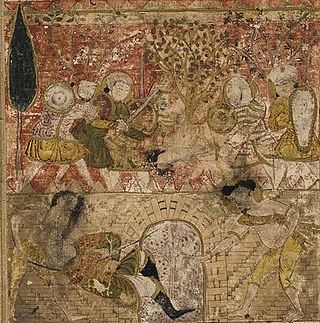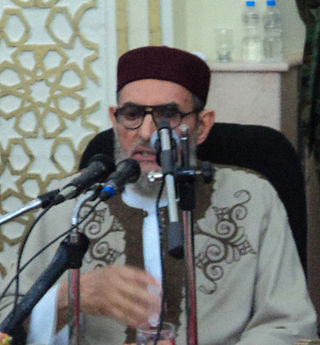
Al-Qaeda is a Sunni pan-Islamist militant organization led by Salafi jihadists who self-identify as a vanguard spearheading a global Islamist revolution to unite the Muslim world under a supra-national Islamic state known as the Caliphate. Its members are mostly composed of Arabs, but also include other peoples. Al-Qaeda has mounted attacks on civilian and military targets in various countries, including the 1998 United States embassy bombings and the September 11 attacks; it has been designated as a terrorist group by the United Nations Security Council, the North Atlantic Treaty Organization (NATO), the European Union, and various countries around the world.

Foreign relations of Saudi Arabia are the diplomatic and trade relations between Saudi Arabia and other countries around the world. The foreign policy of Saudi Arabia is focused on co-operation with the oil-exporting Gulf States, the unity of the Arab world, Islamic solidarity, and support for the United Nations. In practice, the main concerns in recent years have been relations with the US, the Saudi Arabian–led intervention in Yemen, the Israeli–Palestinian conflict, Iraq, the perceived threat from the Islamic Republic of Iran, and the effect of oil pricing. Saudi Arabia contributes large amounts of development aid to Muslim countries. From 1986 to 2006, the country donated £49 billion in aid.

Saudi Arabia, officially the Kingdom of Saudi Arabia (KSA), is a country in West Asia. It covers the bulk of the Arabian Peninsula, and has a land area of about 2150000 km2, making it the fifth-largest country in Asia, the second-largest in the Arab world, and the largest in West Asia and the Middle East. It is bordered by the Red Sea to the west; Jordan, Iraq, and Kuwait to the north; the Persian Gulf, Qatar and the United Arab Emirates to the east; Oman to the southeast; and Yemen to the south. Bahrain is an island country off its east coast. The Gulf of Aqaba in the northwest separates Saudi Arabia from Egypt and Israel. Saudi Arabia is the only country with a coastline along both the Red Sea and the Persian Gulf, and most of its terrain consists of arid desert, lowland, steppe, and mountains. Saudi Arabia's capital and largest city is Riyadh; the kingdom also is the location of Islam's two holiest cities of Mecca and Medina.

Salafi Islam is the state religion of Saudi Arabia. The connection between Islam and modern-day Saudi Arabia is uniquely strong. The kingdom is called the "home of Islam"; the kingdom is also the birthplace of the Prophet Muhammad, with all territories of Saudi Arabia and the Arabian Peninsula being united and ruled by him. It is the location of the cities of Mecca and Medina, where Muhammad, the messenger of the Islamic faith, lived and died. The kingdom attracts millions of Muslim Hajj pilgrims annually, and thousands of clerics and students who come from across the Muslim world to study. The official title of the King of Saudi Arabia is "Custodian of the Two Holy Mosques"—the two being Al-Masjid al-Haram in Mecca and Al-Masjid al-Nabawi in Medina—which are considered the holiest in Islam.

Musayliama the Liar, otherwise known as Maslama ibn Ḥabīb d.632, was a claimant of prophethood from the Banu Hanifa tribe, of which present day descendants include the House of Saud among other Najd tribes. Based from Diriyah in present day Riyadh, Saudi Arabia, he claimed to be a prophet and was an opponent of Islam in 7th-century Arabia. He was a leader during the Ridda wars. He is considered by Muslims to be a false prophet. He is commonly called Musaylima al-Kadhdhāb.
Mark Curtis is a British author, historian and journalist who is the co-founder and editor of media organisation Declassified UK. He is also the author of several books on British foreign policy since the Second World War, including Secret Affairs: Britain's Collusion with Radical Islam, Unpeople: Britain's Secret Human Rights Abuses and Web of Deceit: Britain's Real Role in the World.

Islamic extremism, Islamist extremism, or radical Islam, is used in reference to extremist beliefs and behaviors which are associated with the far-right ideology in Islam. These are controversial terms with varying definitions, ranging from academic understandings to the idea that all ideologies other than Islam have failed and are inferior to Islam. These terms can also be used in reference to other sects of Islam that do not share such beliefs. Political definitions of Islamic extremism include the one which is used by the government of the United Kingdom, which understands Islamic extremism as any form of Islam that opposes "democracy, the rule of law, individual liberty and mutual respect and tolerance of different faiths and beliefs". In 2019, the U.S. Institute for Peace released an important report on extremism in fragile states that developed recommendations focused on adopting a shared understanding, operationalize a prevention framework, and rallying the international community.
The Advice and Reform Committee or Advice and Reformation Committee (ARC) was the British office of what is now called al-Qaeda from 1994 until the arrest of Khalid al-Fawwaz in 1998. A U.S. grand jury indictment of Osama bin Laden, al-Fawwaz, and 19 others reads in part
On or about July 11, 1994, the defendant OSAMA BIN LADEN created the London office of al Qaeda, naming it the “Advice and Reformation Committee” and placing the defendant KHALID AL FAWWAZ in charge;
Since the 1980s Saudi Arabia has provided foreign assistance to many countries and organizations.
Memoirs of Mr. Hempher, The British Spy to the Middle East or Confessions of a British Spy is a document purporting to be the account by an 18th-century British agent, Hempher, of his instrumental role in founding the conservative Islamic reform movement of Wahhabism, as part of a conspiracy to corrupt Islam. It first appeared in 1888, in Turkish, in the five-volume Mir'at al-Haramayn of Ayyub Sabri Pasha. It has been described as "apocryphal", a "forgery", "utter nonsense", and "an Anglophobic variation on The Protocols of the Elders of Zion". It has been widely translated and disseminated, is available on the internet, and still enjoys some currency among some individuals in the Middle East and beyond. In 2002, an Iraqi military officer recapitulated the book in a "top secret document".
Mujahideen, or Mujahidin, is the plural form of mujahid, an Arabic term that broadly refers to people who engage in jihad, interpreted in a jurisprudence of Islam as the fight on behalf of God, religion or the community (ummah).
Islam is the state religion of Saudi Arabia.
The Arab Cold War was a period of political rivalry in the Arab world from the early 1950s to the late 1970s as part of the broader Cold War. The generally accepted beginning of the Arab Cold War was the Egyptian revolution of 1952, which ultimately led to Gamal Abdel Nasser becoming President of Egypt in 1956. Thereafter, newly established Arab republics defined by revolutionary secular nationalism, and largely drawing inspiration from Nasser's Egypt, were engaged in political rivalries of varying degrees of ferocity with conservative traditionalist Arab monarchies, led chiefly by Saudi Arabia. The approximate end point of this period of internecine rivalry and conflict is generally viewed as being the 1979 Iranian Revolution, which culminated in the installation of Ayatollah Ruhollah Khomeini as the leader of Iran's theocratic government. Thereafter, the bitterness of intra-Arab strife was eclipsed by a new era of Arab-Iranian tensions.

Saudis or Saudi Arabians are the citizens and nationals of Kingdom of Saudi Arabia. They are mainly composed of Arabs and live in the five historical Regions: Najd, Hejaz, Asir, Tihamah and Al-Ahsa; the regions which the Kingdom of Saudi Arabia was founded on or what was formerly known as the Kingdom of Hejaz and Nejd in the Arabian Peninsula. Saudis speak one of the dialects of Peninsular Arabic, including the Hejazi, Najdi, Gulf and Southern Arabic dialects, as a mother tongue.

The Inter-Services Intelligence (ISI) intelligence agency of Pakistan allegedly ran an active military intelligence program during the Bosnian War which started in 1992 lasting until 1995. Allegedly executed and supervised by General Javed Nasir, the program distributed and coordinated the systematic supply of arms to ARBiH during the war. The ISI Bosnian contingent was organized with financial assistance provided by Saudi Arabia, according to the British historian Mark Curtis.

Al-Sadiq Abd al-Rahman Ali al-Ghariani has been the Grand Mufti of Libya since 2012. He is a Muslim imam of the Maliki school of thought. Academically he is a seated professor in the College of Sharia in the University of Tripoli since 1969 and distinguished contributor the Maliki school of thought with his numerous publications.
Starting in the mid-1970s and 1980s, Salafism and Wahhabism — along with other Sunni interpretations of Islam favored by the Kingdom of Saudi Arabia and other Gulf monarchies — achieved a "preeminent position of strength in the global expression of Islam."
In March 2014, British Prime Minister David Cameron asked the then British Ambassador to Saudi Arabia, Sir John Jenkins, to lead a government review into the Muslim Brotherhood.
Foreign support in the Bosnian War included the funding, training or military support by foreign states and organizations outside Yugoslavia to any of the belligerents in the Bosnian War (1992–95).

Hafiz Wahba was an Egyptian diplomat who was then naturalised in Saudi Arabia. Fuad Hamza and he were the first ambassadors of Saudi Arabia, the former in France and the latter in the United Kingdom. In addition, they were among the advisers whom King Abdulaziz employed to improve the decision-making process of the state.









